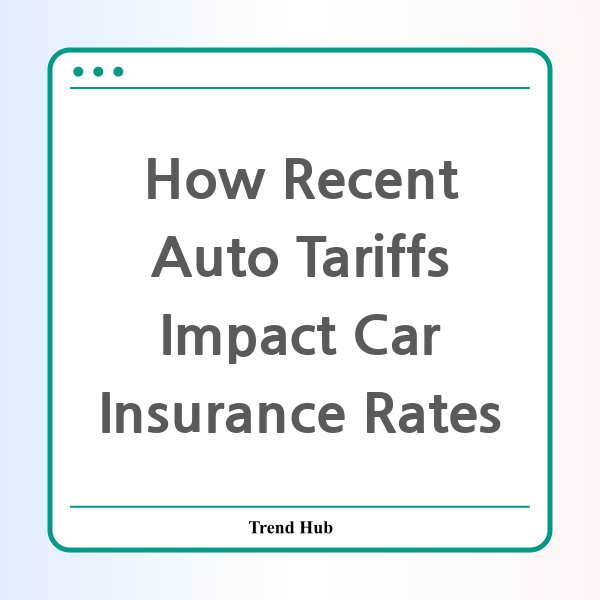* This website participates in the Amazon Affiliate Program and earns from qualifying purchases.

Are you worried about how the recent auto tariffs will affect your car insurance premiums? With the announcement of new tariffs, there’s been a lot of chatter about the potential consequences not only for automakers but also for consumers like you. In this post, we will delve into the complexities of how tariffs may influence car insurance rates, the auto industry, and what you should know.
Recently, we’ve seen significant discussions surrounding the auto industry as President Trump announced a set of tariffs on vehicles imported from Canada and Mexico, which could reach as high as 25%. The intention behind these tariffs is to boost American-made vehicles and protect domestic manufacturers. However, the pressure from automotive giants such as Ford, GM, and Stellantis has already led to a delay in the implementation of these tariffs due to fears of rising vehicle prices and economic uncertainty.
But how do these tariffs translate into changes in car insurance? Here’s what you need to consider:
1. Vehicle Prices and Insurance Costs
The primary effect of tariffs is the increase in vehicle prices. If the cost of manufacturing goes up due to tariffs, these costs will eventually trickle down to consumers when purchasing new vehicles. Higher vehicle prices mean that the insured value (the amount your car insurance covers) will also increase. In turn, this can lead to higher premiums since most car insurance policies are based on the value of the vehicle.
2. Economic Impacts on the Auto Industry
The auto industry has been vocal about the negative impacts of these tariffs. Automotive executives have warned that prices for vehicles could jump dramatically, affecting sales and manufacturing jobs. If the auto industry suffers, this may subsequently lead to a decrease in consumer spending, further influencing economic conditions that impact insurance companies and their rates.
3. Market Instability and Insurance Premiums
Economic instability, as a result of trade wars and tariffs, can make insurance companies wary. When markets fluctuate significantly, as seen with the recent drop in the stock market, insurers may adjust their rate calculations in anticipation of future financial strain. This could mean increased premiums, even if you have a good driving record.
4. The Chain Reaction Effect
It is essential to understand that the auto industry does not operate in a vacuum. Tariff-related price increases can affect the entire economy, including the automotive supply chain and the availability of parts. As production costs rise, insurers may anticipate more claims related to vehicle theft and accidents involving higher-priced vehicles, prompting them to adjust premiums accordingly.
5. What You Can Do
While we cannot control government policies, there are steps you can take to prepare for potential changes in your car insurance. Here are a few tips:
- Shop Around: Always compare insurance rates from different providers. While one company might increase their rates due to economic pressures, others may not.
- Consider Bundling: If you have multiple insurance needs (home, auto, etc.), consider bundling your policies with one provider for potential discounts.
- Maintain a Good Driving Record: Keeping a clean driving record can help in negotiating premiums even during economic downturns.
- Review Your Coverage: Make sure you have adequate but not excessive coverage. Reassessing your coverage can help you save money.
In conclusion, while the recent auto tariffs have created uncertainty in the auto industry and may impact the prices of vehicles, consumers also need to be prepared for potential shifts in car insurance rates. By staying informed and proactive, you can mitigate some of the risks associated with these economic changes.
* This website participates in the Amazon Affiliate Program and earns from qualifying purchases.